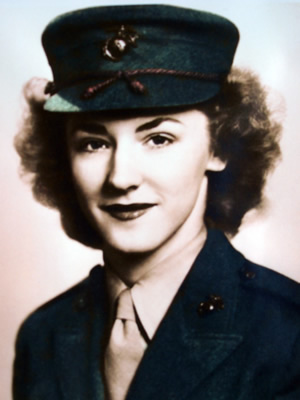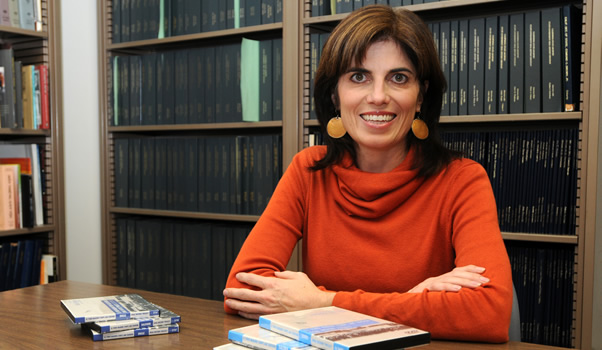War Time Memories
Center for Oral and Public History Captures Recollections of Veterans and Others Once Stationed at El Toro
November 10, 2009
By Natalie M. Fousekis
An Oral History
The late Junamay Leatherby Coffey is featured in this oral history (56 MB MP3) by Natalie M. Fousekis. The transcript (Word .doc) is available for download.
When I asked Junamay Leatherby Coffey about the impact her years in the Marines had on her life, she responded: “Oh, great. My life would have been entirely different … I am so glad that I had that experience. As a matter of fact, if I was young, I’d enlist again tomorrow!”
We were sitting in her small den on Aug. 9, 2007, talking about her years in the U.S. Marine Corps Women’s Reserves during World War II, her life as a Marine wife, and her years spent at the El Toro Marine Corps Air Station.
Days earlier, Coffey had returned home after a short stint in the hospital. As we began the interview, she told me that she just did not feel like herself. Despite recovering from her hospital stay, throughout the interview Coffey displayed her sense of humor and spoke passionately about being a woman Marine during World War II.

Junamay Leatherby Coffey in the 1940s.
As we talked after the interview, she shared with me how she could not wait to get her strength back so she could get out on the golf course. I don’t know if she ever played golf again. Coffey died Nov. 5, 2007, six weeks before her 87th birthday. Fortunately for her family and for the history of El Toro, we have a digital recording of her life and memories.
My interview with Coffey is just one of the almost 250 interviews my students, my colleague Volker Janssen, and I have recorded with the men and women who were stationed at, worked on, or lived near the El Toro Marine Corps Air Station.
Eighteen students, trained specifically in oral history methodology, have gained hands-on research experience and the privilege of having these men and women share their stories with them. History majors and graduate students have recorded the bulk of the interviews for the El Toro Marine Corps Air Station Oral History Project. This research team and I have spent the past two-and-a-half years conducting interviews focused on the World War II and Korean War eras.
While many stories of El Toro are upbeat, these interviews also reveal the cost and sacrifice of war — both through the descriptions by those who witnessed the horrors and returned safely as well as their recollections of those who went to the Pacific or Korea, but never came home. The memories recorded in this project have a specific value to Orange County, but they also resonate with the stories of veterans of other wars in the 20th century and the current wars in Iraq and Afghanistan.
In 2007, the Center for Oral and Public History, with funding from the Orange County Great Park Corporation, launched the El Toro Marine Corps Air Station Oral History Project.
We focused the first phases of the project on those who have significant memories of El Toro during the World War II and Korean War eras, precisely because we knew that within 10 years, the memories of these eras would be gone as more and more who lived through them passed away. Ultimately, this collaborative effort will include interviews with those stationed at the base and who lived in the surrounding communities during the Cold War, the Vietnam War, Desert Storm, and finally, during the transition from a Marine Corp Air Station to the Orange County Great Park.
While this project has provided a great opportunity for my students, it has an important scholarly contribution to make as well. Through the voices of our narrators, the El Toro Project examines Orange County’s evolution during a moment of extraordinary transition — from war to peace, from agriculture to industry and from small towns to bedroom communities.
When the U.S. military broke ground for the base on the former Irvine Ranch lima bean fields in 1942, Orange County’s population numbered less than 150,000. When the base closed in 1999, the county housed more than 2.9 million residents and had undergone a sweeping transformation.
Thus far, this project examines the roots of these dramatic changes. It investigates the impact of America’s militarization on the region and the community, the transformation of the region’s economy after World War II and the changing demographics of the county. At the center of this history are the voices and memories collected as part of the El Toro Oral History Project. As such, it will not only explore the key role the base played in this moment of transition, but also will allow individual experience and reflection to shape this history of the region.
By examining the transformation of Orange County with the El Toro base at the center of the story, our project addresses an important gap in both scholarship about the region and the importance of military bases to the transformation of the nation during and after World War II.
Scholars have produced scores of books on the history of Los Angeles, but despite repeated calls by the few professional historians who have studied Orange County, Los Angeles’ neighboring communities have received comparatively little attention. Moreover, not much has been written by U.S. historians about the relationship between a military base and the community that surrounds it.
The postwar military industrial complex, spurred by the Cold War with the Soviet Union, did not just lead to the building of bombers and military equipment, but also shaped migration patterns, business development, and regional politics. Orange County provides a microcosm in which to explore the resulting transformations, which also occurred in dozens of other military base host communities across the nation. Though vital to the history of war-time and postwar America, these communities’ stories have yet to be told.
As we continue to gather the stories of the El Toro base and its surrounding communities, we will document the county’s dramatic changes after World War II as well as preserve the memories of men and women who served the nation in times of war.
Natalie M. Fousekis is director of Cal State Fullerton’s Center for Oral and Public History and associate professor of history.


